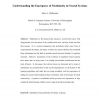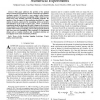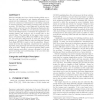153 search results - page 28 / 31 » Semi-supervised learning by disagreement |
NIPS
2003
13 years 11 months ago
2003
Why are sensory modalities segregated the way they are? In this paper we show that sensory modalities are well designed for self-supervised cross-modal learning. Using the Minimiz...
COGSCI
2007
13 years 9 months ago
2007
: Modularity in the human brain remains a controversial issue, with disagreement over the nature of the modules that exist, and why, when and how they emerge. It is a natural assum...
TNN
2008
13 years 9 months ago
2008
This paper addresses the problem of the optimal design of numerical experiments for the construction of nonlinear surrogate models. We describe a new method, called learner disagre...
GECCO
2008
Springer
13 years 11 months ago
2008
Springer
Selective sampling is a form of active learning which can reduce the cost of training by only drawing informative data points into the training set. This selected training set is ...
ICML
2010
IEEE
13 years 11 months ago
2010
IEEE
We propose a novel boosting algorithm which improves on current algorithms for weighted voting classification by striking a better balance between classification accuracy and the ...



